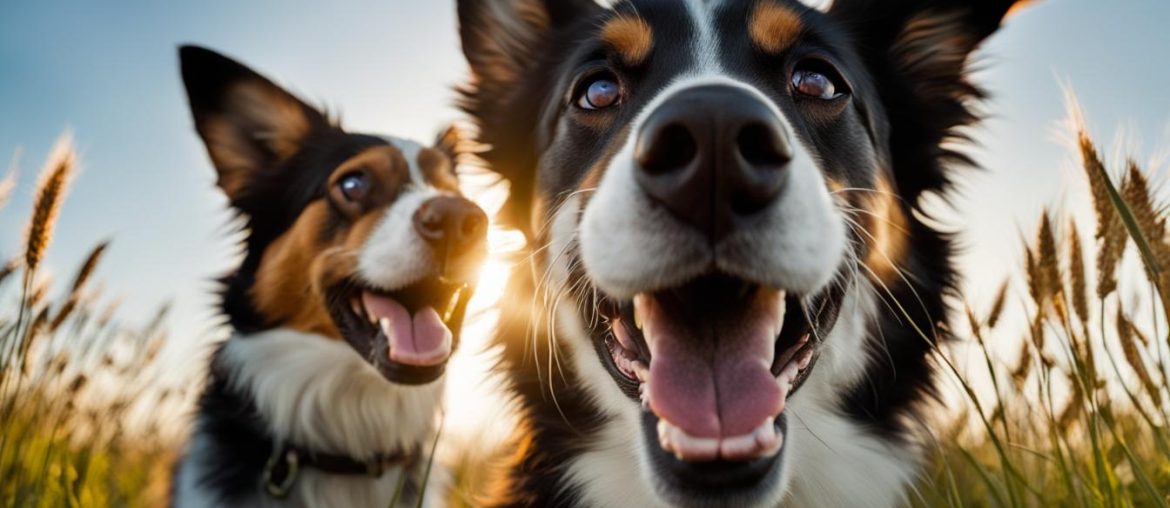Have you ever noticed your dog licking the air and wondered why they do it? In this comprehensive guide, we will explore the various reasons behind this behavior and what it could mean for your furry friend’s health and well-being.
Key Takeaways:
- Dogs may lick the air to amplify their sense of smell, communicate stress or anxiety, alleviate dental pain, remove foreign objects, cope with gastrointestinal issues, manage skin problems, exhibit compulsive behavior, or indicate cognitive dysfunction.
- Occasional air licking is generally considered normal, but excessive or persistent licking should be monitored and may require a visit to the veterinarian.
- Proper diagnosis and treatment are essential to address the underlying cause and improve your dog’s well-being.
- Understanding your dog’s behavior and seeking professional advice can help ensure their overall health and happiness.
Is It Normal For Dogs to Lick the Air?
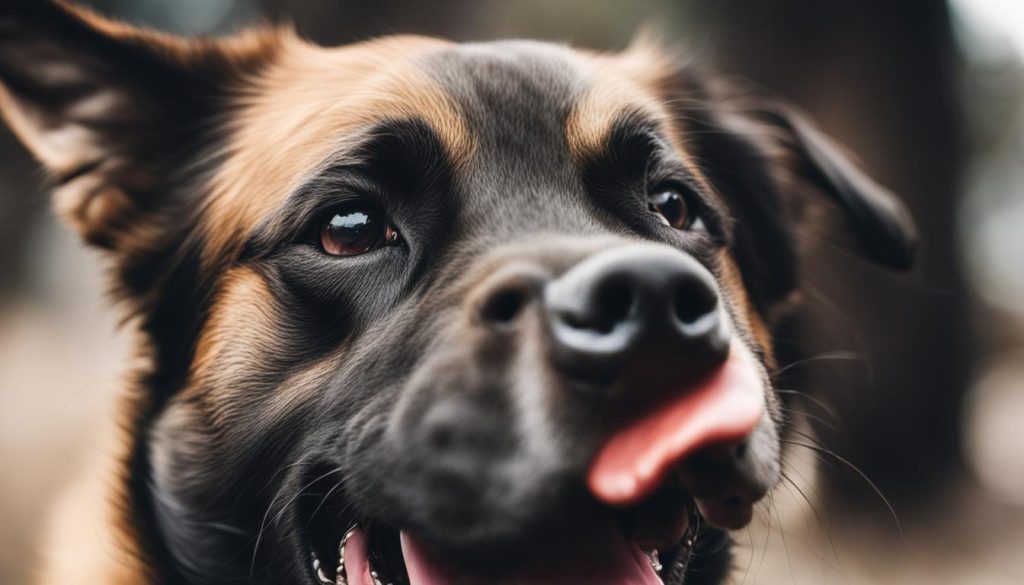
Dogs licking the air can be considered normal behavior. It’s important to understand that occasional air licking is generally not a cause for concern. Dogs use this behavior as a form of canine communication, expressing a range of messages through their actions. While it may seem peculiar to us, it’s a natural behavior for our furry friends.
Occasional air licking typically occurs when dogs are trying to amplify their sense of smell or communicate stress or anxiety. They may also lick the air to alleviate dental pain, remove foreign objects, cope with gastrointestinal issues, manage skin problems, exhibit compulsive behavior, or indicate cognitive dysfunction. However, it’s crucial to monitor any changes in frequency or duration of air licking, as excessive or persistent licking may be indicative of underlying issues.
As pet owners, it’s our responsibility to be observant and attentive to our dogs’ behaviors. If you notice that your dog’s air licking is becoming excessive or abnormal, it’s important to consult with a veterinarian. They will be able to assess the situation, identify any potential underlying causes, and provide appropriate treatment options tailored to your furry friend’s specific needs. Remember, understanding what is normal for your dog and seeking professional guidance when needed is essential in ensuring their overall health and well-being.
Amplifying Their Sense of Smell
Dogs have an incredible sense of smell, thanks to their vomeronasal organ (Jacobson’s organ). By licking the air, dogs can enhance their sense of smell by directing more odor molecules to their vomeronasal organ, which has significantly more olfactory receptors than human noses. This behavior allows dogs to better explore and understand their environment through scent.
The vomeronasal organ, located in the roof of a dog’s mouth, plays a crucial role in their scent detection abilities. When a dog licks the air, it collects airborne molecules on its tongue, which are then transferred to the vomeronasal organ. The increased number of olfactory receptors in this organ allows dogs to process and analyze these scent molecules more effectively.
This amplification of their sense of smell through air licking enables dogs to gather valuable information about their surroundings. They can detect scents from other animals, identify potential danger, and even locate specific objects or individuals. By licking the air, dogs are utilizing a natural instinct to enhance their sensory perception and gain a deeper understanding of their environment.
Dog Stress and Anxiety: Understanding Submissive Behavior and Licking as a Sign of Submission
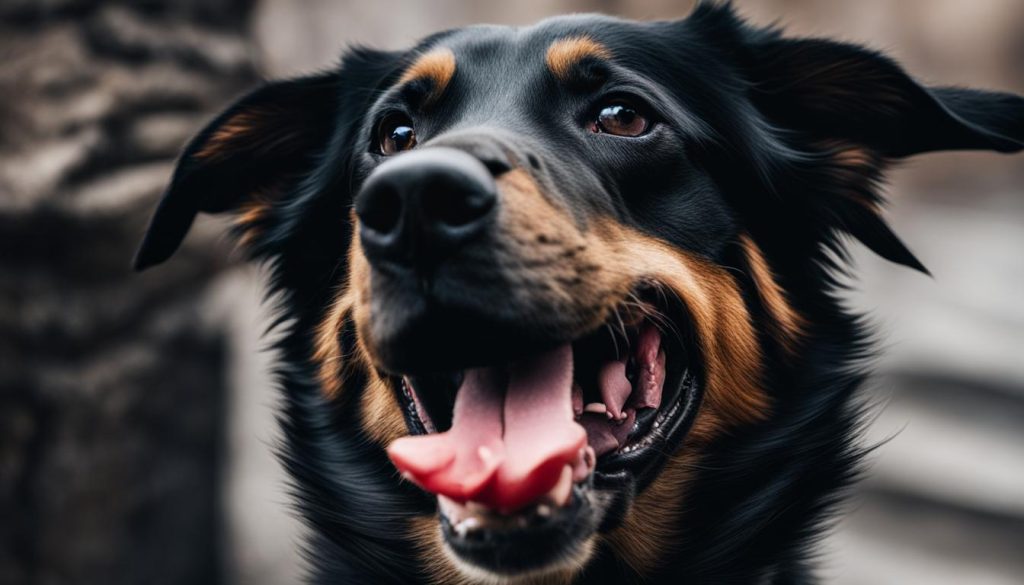
Dogs, like humans, can experience stress and anxiety. However, they often display their distress in different ways. One common behavior associated with dog stress and anxiety is licking the air. This action can be a sign of submission, as dogs use it to communicate their understanding of the hierarchy and try to appease more dominant individuals.
Submissive behavior, including air licking, is typically exhibited when a dog feels threatened, anxious, or overwhelmed. It is a natural instinct for dogs to display deference to perceived dominant figures as a way to reduce tension and potential conflict. By observing a dog licking the air, we can interpret it as their way of seeking harmony within their social structure.
Reducing anxiety in dogs is crucial for their overall well-being. To help alleviate stress and anxiety in your furry companion, there are several strategies you can implement. Avoiding direct eye contact, using a calm and high-pitched voice, and providing alternative activities can all help create a more relaxed environment. Additionally, some dogs may benefit from anti-anxiety supplements or medications prescribed by a veterinarian.
Understanding and addressing your dog’s stress and anxiety can lead to a healthier and happier canine companion. By recognizing licking as a sign of submission and taking steps to reduce anxiety, you can help your dog feel more secure and content in their environment.
Table: Common Signs of Dog Stress and Anxiety
| Behavior | Description |
|---|---|
| Excessive panting | Rapid and excessive breathing, often accompanied by drooling |
| Pacing | Restlessness and constant movement without a clear purpose |
| Tail tucking | Pulling the tail tightly against the body as a sign of fear or anxiety |
| Excessive barking or whining | Unusual and persistent vocalization as a response to stress |
| Destructive behavior | Chewing on furniture, shoes, or other objects as a coping mechanism |
References:
“Understanding Dog Anxiety and Fears.” American Veterinary Medical Association, www.avma.org/resources/pet-owners/petcare/understanding-animal-anxiety-fears. Accessed 8 May 2022.
“Dog Licking Air: What Does It Mean?” American Kennel Club, www.akc.org/expert-advice/health/dog-licking-air-what-does-it-mean/. Accessed 8 May 2022.
Dental Disease and Painful Teeth
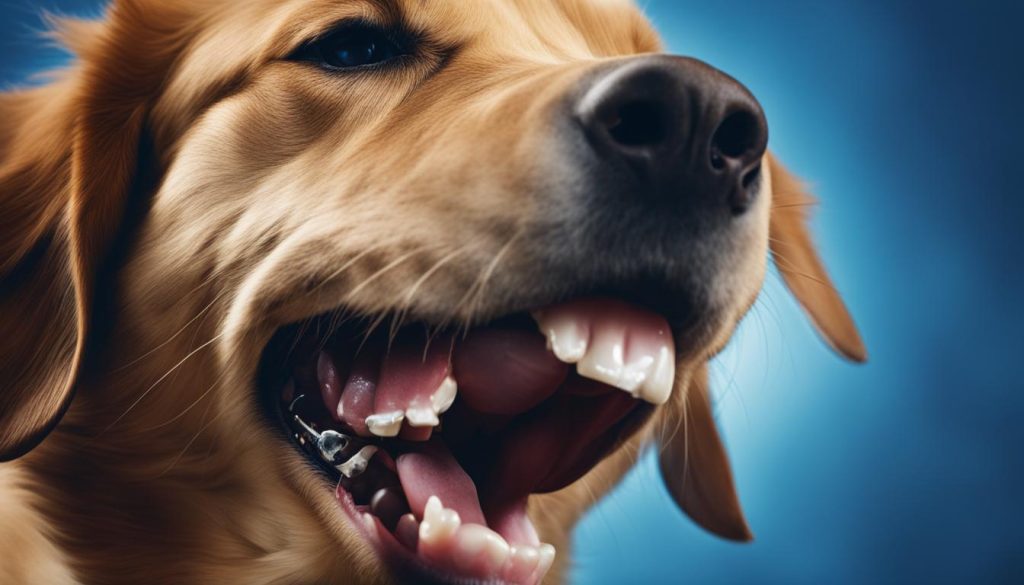
Proper dental care is essential for dogs to maintain optimal oral health. Dental disease and painful teeth can cause discomfort and lead to various behavioral changes, including licking the air. Dogs may exhibit this behavior as a way to alleviate the pain associated with dental issues.
Regular professional cleanings can help prevent the buildup of plaque and tartar, which can contribute to dental disease. During these cleanings, the veterinarian will also perform an oral exam to identify any loose or painful teeth. If a loose tooth or dental pain is detected, appropriate treatment options can be explored.
Signs of dental issues in dogs include halitosis (bad breath), excessive drooling, difficulty picking up food, or excessive licking of the lips, teeth, or air. If you notice any of these signs, it is advisable to schedule an oral exam with a veterinarian to address the underlying dental problems.
| Signs of Dental Issues in Dogs | Treatment Options |
|---|---|
| Halitosis (bad breath) | Regular professional cleanings, dental extractions if necessary |
| Excessive drooling | Root canal therapy, dental fillings, or crowns |
| Difficulty picking up food | Antibiotics, pain medication, extraction of loose teeth |
| Excessive licking of lips, teeth, or air | Oral health maintenance, dental treatments, extraction of painful teeth |
Remember, regular dental care and early detection of dental issues are crucial to ensuring your dog’s overall health and well-being. Consult with a veterinarian to establish a dental care routine and address any dental concerns your dog may have.
Foreign Object in the Mouth
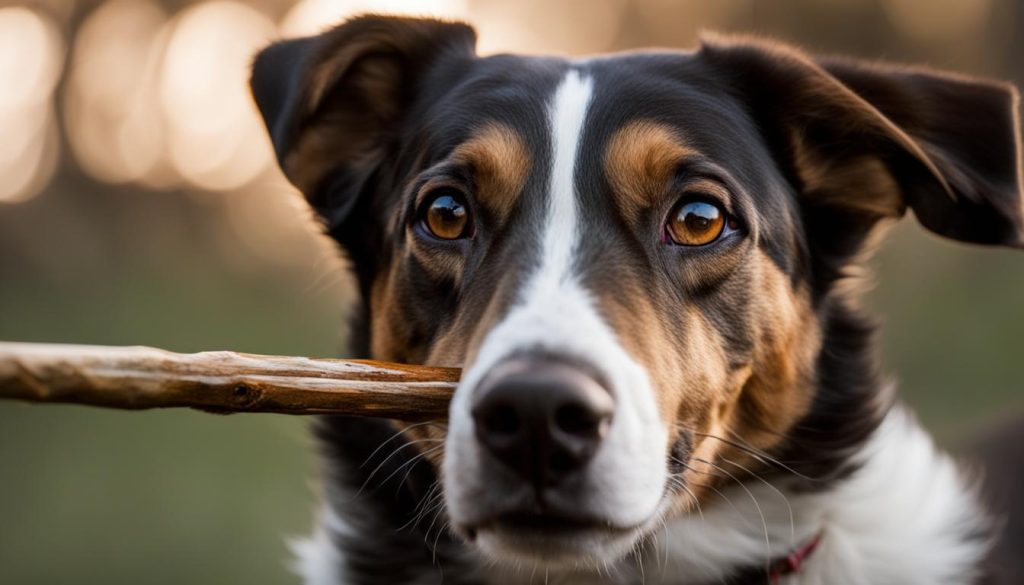
Dogs may lick the air when they have a foreign object, such as a stick or debris, stuck in their mouth. Just like humans use their tongues to remove food stuck between teeth, dogs may lick the air in an attempt to dislodge the object. It may be necessary to sedate the dog to safely remove the object and resolve the licking behavior. Chewing on dangerous objects that can cause mouth injuries or gastrointestinal issues should be avoided to prevent further problems.
Dangerous Objects for Dogs
Table 1: Common dangerous objects for dogs
| Object | Potential Risks |
|---|---|
| Bones | Choking, intestinal blockage, dental fractures |
| Plastic bags | Suffocation, choking |
| Small toys | Choking, intestinal blockage |
| Household chemicals | Poisoning, irritation |
If you suspect that your dog has a foreign object in their mouth, it is important to seek veterinary attention immediately. Attempting to remove the object yourself may cause further harm or injury. The veterinarian will perform a thorough examination, including sedation if necessary, to safely remove the object and ensure the dog’s mouth is free from any debris or potential sources of discomfort.
Preventing access to dangerous objects and providing appropriate chew toys can help minimize the risk of foreign objects in the mouth. Regularly inspecting your dog’s environment for potential hazards and ensuring they have a healthy diet will contribute to their overall well-being and reduce the likelihood of licking behavior caused by foreign objects or mouth injuries.
Dog Gastrointestinal Issues: Understanding Nausea, Upset Stomach, and More
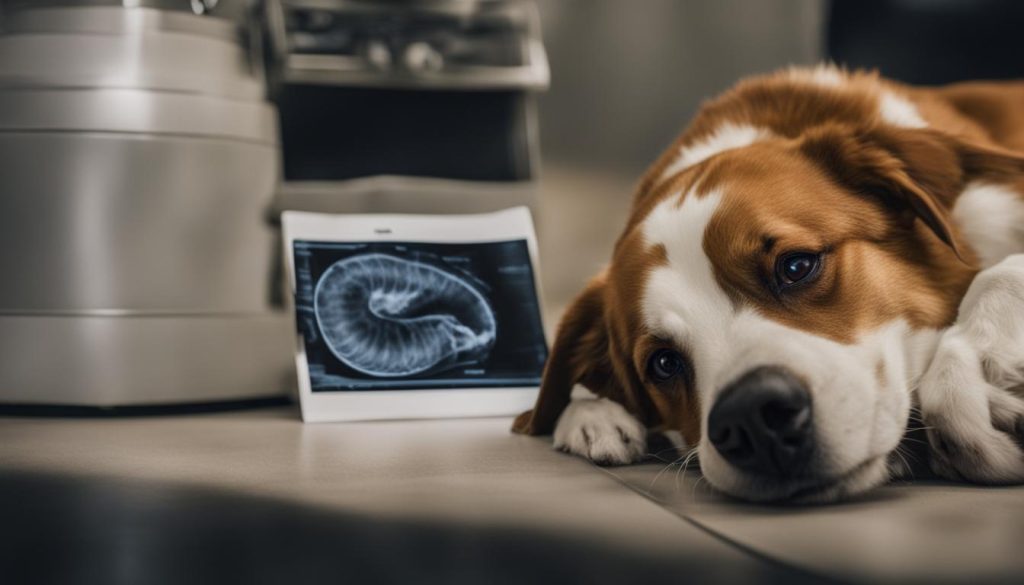
When it comes to dogs, gastrointestinal (GI) issues can be a common concern. From nausea and upset stomach to vomiting and diarrhea, these problems can significantly impact a dog’s well-being. Understanding the causes and symptoms of dog gastrointestinal issues is essential for effective management and treatment.
Common Causes of Dog Gastrointestinal Issues
There are several factors that can contribute to gastrointestinal issues in dogs. A change in diet, especially a sudden transition to a new type of food, can upset a dog’s stomach and lead to digestive disturbances. Food sensitivities and allergies can also trigger gastrointestinal problems in dogs, causing symptoms like vomiting and diarrhea.
Pancreatitis, an inflammation of the pancreas, is another common cause of GI issues in dogs. This condition can lead to abdominal pain, nausea, and vomiting. Additionally, dogs can develop irritable bowel syndrome, which is characterized by chronic gastrointestinal distress.
Managing Dog Gastrointestinal Issues
If your dog is experiencing gastrointestinal issues, it is important to consult with a veterinarian for a proper diagnosis and treatment plan. The vet may recommend dietary changes, such as feeding a sensitive stomach diet or hypoallergenic food, to alleviate symptoms. They may also prescribe medication to address underlying inflammation or provide supportive care to manage nausea and vomiting.
Furthermore, it is crucial to monitor your dog’s eating habits and ensure they have access to fresh water at all times. Avoid giving your dog table scraps or foods that are known to be difficult to digest. Maintaining a consistent feeding schedule and avoiding drastic diet changes can also help prevent gastrointestinal issues.
| Symptoms of Dog Gastrointestinal Issues | Possible Causes |
|---|---|
| Vomiting | Change in diet Food sensitivity Pancreatitis |
| Diarrhea | Change in diet Food sensitivity Pancreatitis Irritable bowel syndrome |
| Nausea | Change in diet Food sensitivity Pancreatitis Irritable bowel syndrome |
Remember, if your dog is experiencing persistent or severe gastrointestinal issues, it is essential to seek veterinary care. Prompt diagnosis and appropriate treatment can help alleviate your dog’s discomfort and improve their overall health and well-being.
Dog Skin Problems: Understanding Itching and External Parasites
When it comes to our furry companions, skin problems can be a common issue. Dogs may experience itching and discomfort caused by various factors, including external parasites, food allergies, and sensitive skin. Understanding these problems and taking appropriate measures can help alleviate your dog’s discomfort and improve their overall well-being.
Common External Parasites
External parasites, such as fleas and ticks, can cause intense itching and irritation in dogs. Regular flea prevention is crucial in preventing infestations and reducing the risk of associated skin problems. It’s recommended to consult with your veterinarian to find the most suitable flea prevention method for your dog, whether it be topical treatments, oral medications, or collars. Additionally, periodic grooming and thorough inspections can help detect and remove any external parasites promptly.
Identifying Food Allergies
Dogs can develop allergies to certain ingredients in their diet, leading to skin problems and itching. If you suspect your dog has a food allergy, it’s essential to work with your veterinarian to identify the specific allergens causing the reaction. This may involve conducting an elimination diet, where potential allergens are removed from the dog’s diet and gradually reintroduced to pinpoint the culprit. Once identified, your veterinarian can recommend an appropriate diet that avoids the allergens and supports your dog’s skin health.
Caring for Sensitive Skin
Some dogs have naturally sensitive skin, making them more prone to itching and irritation. Providing a sensitive skin diet rich in omega fatty acids can help improve skin health and reduce symptoms of itching. Omega fatty acids have anti-inflammatory properties that promote healthy skin and coat. Your veterinarian may recommend specific commercial diets or supplements that contain optimal levels of omega fatty acids to support your dog’s skin health. Additionally, using gentle hypoallergenic shampoos and avoiding harsh chemicals in grooming products can help minimize skin irritation and maintain a healthy skin barrier.
By understanding the causes of skin problems in dogs and implementing appropriate preventive measures and treatments, you can help your furry friend find relief from itching and discomfort, leading to a happier and healthier life.
Compulsive Behavior in Dogs: Understanding the Causes and Treatment
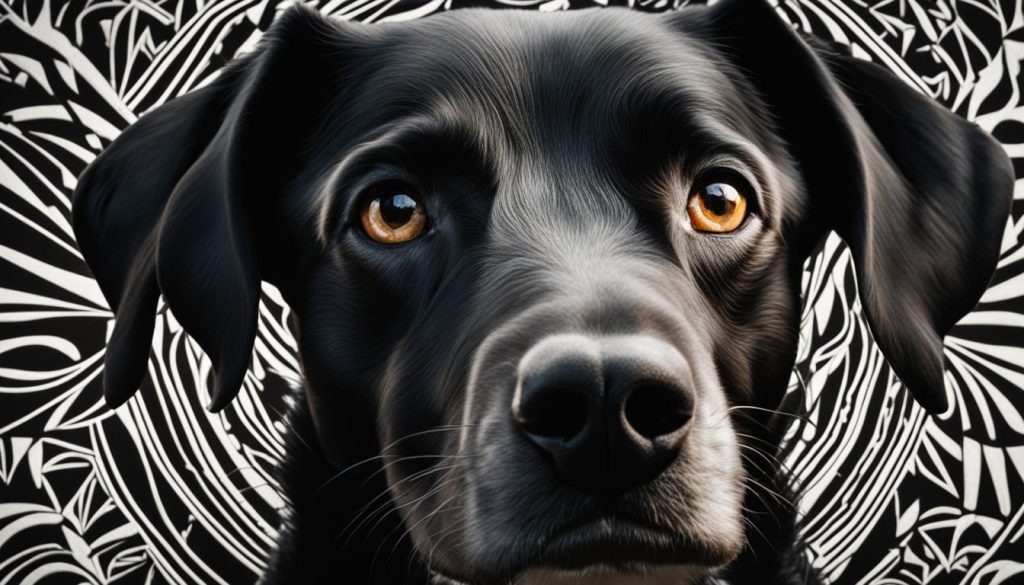
Compulsive licking is a behavior observed in some dogs that can be a result of anxiety or stress. Dogs with compulsive behavior often display repetitive actions, such as excessive licking, which can be detrimental to their well-being. To address this issue, it is important to understand the underlying causes and seek appropriate treatment.
One of the primary causes of compulsive behavior in dogs is anxiety. Dogs that experience chronic stress or anxiety may develop repetitive behaviors, including compulsive licking. These behaviors serve as a coping mechanism for the dog, providing temporary relief from their anxiety. In such cases, it is crucial to address the underlying anxiety through behavior modification techniques, environmental management, and, in severe cases, anti-anxiety medication prescribed by a veterinary neurologist.
It is essential to differentiate between compulsive behavior and normal grooming. While dogs naturally groom themselves, excessive and compulsive licking goes beyond normal grooming behavior. If a dog repetitively licks the same area for an extended period or displays other repetitive actions, it may indicate a compulsive disorder.
Table: Common Causes of Compulsive Behavior in Dogs
| Cause | Description |
|---|---|
| Anxiety and Stress | Dogs may develop compulsive behavior as a response to chronic stress or anxiety. |
| Environmental Factors | Unstimulating or high-stress environments can contribute to the development of compulsive behaviors. |
| Genetic Predisposition | Some breeds are more prone to developing compulsive behaviors than others. |
| Medical Conditions | Underlying medical conditions, such as allergies or neurological disorders, can contribute to compulsive behaviors. |
If your dog is exhibiting compulsive licking behavior, it is important to consult with a veterinary neurologist. They can provide a thorough evaluation to determine the underlying cause of the behavior and recommend appropriate treatment options. Treatment may involve a combination of behavior modification techniques, environmental enrichment, and medication, if necessary. With proper care and management, compulsive behaviors in dogs can be effectively controlled, improving the overall quality of life for both the dog and its owner.
Cognitive Dysfunction in Dogs: Understanding Repetitive Behavior and Cognitive Impairment
Canine cognitive dysfunction, also known as dog dementia, can cause various changes in a dog’s behavior, including repetitive actions such as licking the air. Similar to Alzheimer’s disease in humans, cognitive dysfunction in dogs is associated with cognitive impairment and can affect their overall well-being. Early detection and veterinary evaluation are essential to address the underlying cause and provide appropriate management strategies.
Dogs with cognitive dysfunction may exhibit repetitive behavior, such as excessive air licking, pacing, or barking. These actions can be accompanied by disorientation, changes in sleep patterns, reduced responsiveness to commands, or house soiling. It is important to note that these symptoms can also be caused by other medical conditions, so a thorough veterinary evaluation is necessary to determine the underlying cause.
Veterinarians may conduct a series of tests, including physical examinations, neurological assessments, and bloodwork, to rule out other potential health issues and provide a diagnosis of cognitive dysfunction. Once diagnosed, management options may include environmental enrichment, dietary modifications, mental stimulation exercises, and, in some cases, medication to help manage the symptoms. The goal is to enhance the dog’s quality of life and slow down the progression of cognitive decline.
Understanding and addressing cognitive dysfunction in dogs is crucial to ensure their overall well-being and provide them with the support and care they need as they age. By recognizing the signs of repetitive behavior and cognitive impairment, pet owners can take proactive steps to seek veterinary evaluation and implement appropriate strategies to improve their dog’s cognitive health.
Table: Common Symptoms of Canine Cognitive Dysfunction
| Behavioral Changes | Physical Changes |
|---|---|
|
|
When Should You Worry If a Dog Is Licking the Air?
While occasional air licking is generally not a cause for concern, excessive or persistent licking should prompt a visit to the veterinarian. If you notice that your dog is licking the air more frequently or for longer durations, it may indicate an underlying issue that needs attention.
One way to gather more information about your dog’s air-licking behavior is to record a video of it at home. Try to capture the behavior both when you are present and when your dog is alone. This can help identify any triggers or patterns related to human presence or specific situations. Sharing the video with your veterinarian can provide valuable insights for further evaluation.
In some cases, excessive air licking in dogs can be a symptom of focal seizures, a type of seizure that affects a specific area of the brain. If your dog’s air-licking behavior is accompanied by other signs such as muscle twitching, drooling, or altered consciousness, it is important to consult with a veterinary neurologist for a thorough evaluation and diagnosis.
| Signs to Watch For | Possible Causes |
|---|---|
| Excessive or persistent air licking | Stress, anxiety, dental pain, gastrointestinal problems, skin issues, compulsive behavior, cognitive dysfunction |
| Air licking accompanied by other signs such as muscle twitching, drooling, or altered consciousness | Possible focal seizures |
Remember, each dog is unique, and the underlying cause of excessive air licking may vary. A veterinary visit is essential to determine the cause and provide appropriate treatment options to address the issue effectively.
Wrapping Up
In summary, air licking in dogs can have various causes, including natural behavior, stress or anxiety, dental issues, gastrointestinal problems, skin problems, compulsive behavior, or cognitive dysfunction. It’s important to monitor any changes in frequency or duration of air licking to identify potential underlying problems.
Veterinary consultation is highly recommended to determine the cause of air licking and provide appropriate treatment options tailored to the specific dog. Addressing the underlying cause is crucial in managing and improving the dog’s overall well-being.
If you notice excessive or persistent air licking in your dog, it’s best to schedule a visit with your veterinarian. They can evaluate your dog’s behavior, conduct any necessary tests or examinations, and recommend the most suitable course of action to address the underlying cause of the air licking.
FAQ
Is it normal for dogs to lick the air?
Yes, licking the air can be considered normal behavior for dogs. However, it’s important to monitor any changes in frequency or duration of air licking.
Why do dogs lick the air?
Dogs lick the air for various reasons, including to amplify their sense of smell, communicate stress or anxiety, alleviate dental pain, remove foreign objects, cope with gastrointestinal issues, manage skin problems, exhibit compulsive behavior, or indicate cognitive dysfunction.
How can licking the air enhance a dog’s sense of smell?
By licking the air, dogs direct more odor molecules to their vomeronasal organ, which has significantly more olfactory receptors than human noses. This behavior allows dogs to better explore and understand their environment through scent.
What can cause dogs to lick the air due to stress or anxiety?
Dogs may lick the air as a submissive behavior to communicate anxiety or stress, especially in the presence of more dominant individuals. This behavior helps them navigate the hierarchy and appease perceived dominant figures.
Can dental issues cause dogs to lick the air?
Yes, dogs with dental disease or painful teeth may lick the air to alleviate discomfort. Regular dental care, including professional cleanings, is important for maintaining oral health in dogs.
Why would a dog lick the air to remove a foreign object?
Dogs may lick the air to dislodge a foreign object that is stuck in their mouth. It may be necessary to sedate the dog to safely remove the object and resolve the licking behavior.
Can gastrointestinal issues cause dogs to lick the air?
Yes, dogs may lick the air to cope with gastrointestinal issues such as nausea or upset stomach. It’s important to consult with a veterinarian if the air-licking is accompanied by vomiting, diarrhea, or a decreased appetite.
Why do dogs lick the air when they have skin problems?
Dogs with itchy skin or external parasites may lick the air in an attempt to relieve the itchiness. Allergies, both food and environmental, can also contribute to skin issues in dogs.
What can cause compulsive licking in dogs?
Compulsive licking can develop in dogs as a result of anxiety and may progress into a compulsive disorder. Additional training and environmental changes may be necessary to manage the behavior, and anti-anxiety medications may be prescribed by a veterinarian in some cases.
Can cognitive dysfunction cause dogs to lick the air?
Yes, dogs, especially as they age, may develop cognitive dysfunction similar to Alzheimer’s disease in humans. One of the symptoms can be repetitive behavior, including licking the air.
When should I worry if my dog is licking the air excessively?
Excessive or persistent air licking should prompt a visit to the veterinarian. It is advisable to record a video of the behavior and consult with a veterinary professional to determine the underlying cause and appropriate treatment options.
How important is veterinary consultation in addressing air licking behavior in dogs?
Veterinary consultation is crucial in identifying and addressing the underlying cause of air licking in dogs. A veterinarian can provide a proper diagnosis and recommend tailored treatment options to improve the dog’s well-being.


